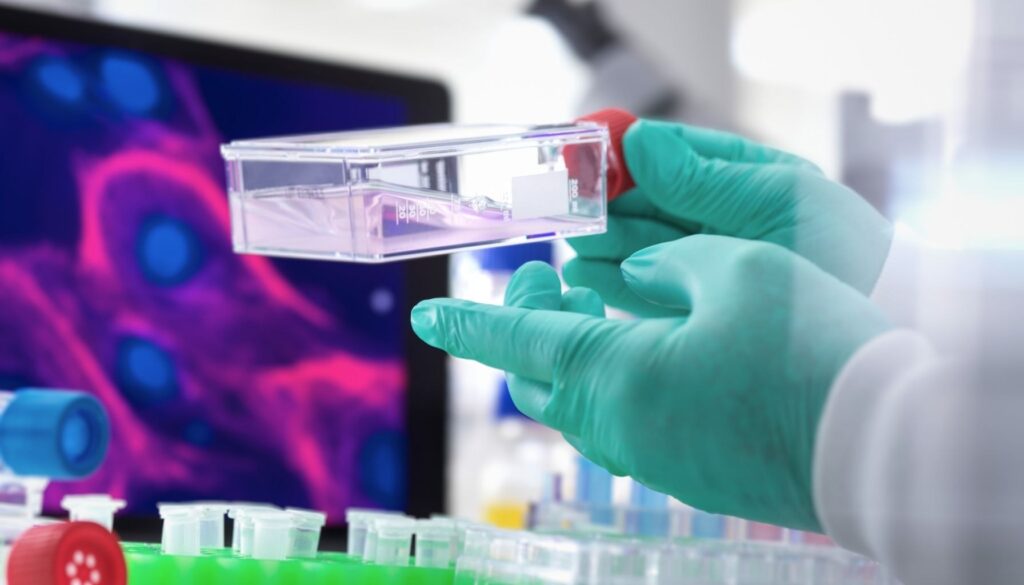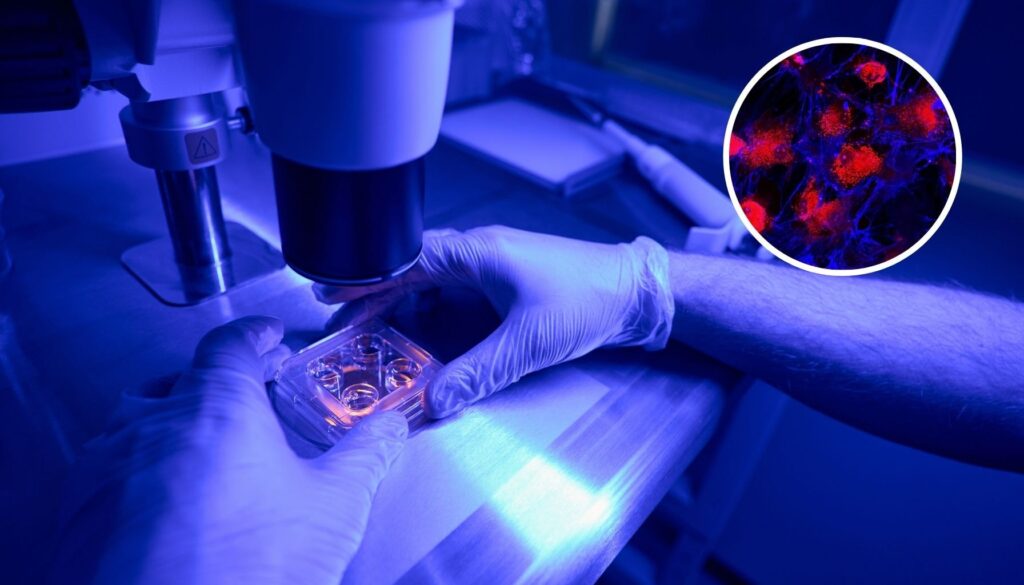
Introduction
Stem cell therapy is one of the most exciting advancements in medicine, with potential treatments for everything from joint pain to chronic diseases. But with that comes the rise of “stem cell tourism,” where patients travel abroad, to Mexico and other parts of Central and South America, to save some money or get around the wait times.
These foreign clinics might offer lower prices and faster access to care, but a lot of the time they lack the regulatory oversight to ensure safe and effective treatments. One big risk is expanded (or “duplicate”) stem cells—a practice that can lower the cost of treatment but at a huge cost to your health. Additionally, the use of unapproved stem cell products in these treatments can pose significant risks due to the lack of regulation and oversight.
In this article we’ll walk you through the hidden dangers of getting stem cell therapy abroad, focusing on expanded stem cells and why the cheaper, quicker option isn’t always the best.
Understanding Stem Cells And Stem Cell Therapy
What Are Stem Cells And How Do They Function?
Stem cells are absolutely remarkable cells with the unique ability to develop into various cell types in the body. They play a pivotal role in the growth, repair, and maintenance of tissues and organs. What sets stem cells apart are their two main properties: self-renewal and differentiation. Self-renewal allows stem cells to divide and produce more stem cells, ensuring a continuous supply. Differentiation enables them to transform into specialized cells that perform specific functions, such as muscle cells, nerve cells, or blood cells.
There are several types of stem cells, each with distinct capabilities:
Embryonic Stem Cells: Derived from embryos, these cells can differentiate into any cell type in the body, making them highly versatile.
Adult Stem Cells: Found in adult tissues like bone marrow or fat, these cells have a more limited ability to differentiate, typically into cell types of their tissue of origin.
Induced Pluripotent Stem Cells (iPSCs): Created in the lab by reprogramming adult cells, iPSCs can differentiate into any cell type, similar to embryonic stem cells.
What Is Stem Cell Therapy?
Stem cell therapy, also known as regenerative medicine, or regenerative stem cell injections, harnesses the power of stem cells to repair or replace damaged or diseased cells, tissues, or organs. The primary goal of stem cell therapy is to stimulate the body’s natural healing processes and restore normal function to affected areas. This innovative treatment is becoming increasingly popular for a wide range of conditions, from degenerative diseases and injuries to genetic disorders.
The typical process of stem cell therapy involves several key steps:
Harvesting: Stem cells are collected from the patient’s own body (autologous) or from a donor (allogeneic).
Processing: The harvested stem cells are processed and prepared for injection, ensuring they are viable and ready for use.
Injection: The processed stem cells are injected into the affected area, where they can begin their work.
Differentiation: Once in the body, the stem cells differentiate into the necessary specialized cells, replacing damaged or diseased cells and promoting healing.
Stem cell therapy’s potential is vast, but it’s crucial to make sure that treatments are conducted safely and ethically, adhering to rigorous standards and regulations set by the N.I.H..
Stem Cell Tourism
The promise of affordable healthcare has spawned medical tourism across many treatments, and stem cell therapy is one of the most popular. Clinics in Mexico and Colombia are cashing in on the demand by offering what looks like the same treatments as in the US, but at a fraction of the cost.
Patients go to these clinics for several reasons. In addition to the lower cost, they promise quicker results and shorter wait times than US clinics where patients face long approval processes or higher fees. Plus they market aggressively, with success stories and downplaying the risks.
However, the importance of rigorous clinical trials cannot be overstated. These trials are essential for evaluating investigational treatments and ensuring their safety and efficacy through stringent oversight.
But this rapid growth of tourism comes with big dangers—dangers that patients don’t realize until it’s too late.
What Are "Expanded" Stem Cells?

One of the biggest risks in foreign stem cell clinics is the use of expanded stem cells. These are cells that have been duplicated or “expanded” in a lab from a single batch of stem cells. The process allows clinics to create more stem cells from a limited supply, making treatments much cheaper to produce and offer to patients.
Many adverse events involve the injection of either autologous or donor stem cells, especially in unapproved interventions. These treatments can lead to serious infections and other complications, highlighting the need for regulatory oversight.
But unlike in the US where stem cells are regulated on how they are collected, processed and used, foreign clinics have little oversight. This lack of regulation means expanded stem cells are not always produced according to the strict protocols that ensure their safety and efficacy.
The Dangers Of Expanded Stem Cells
Expanded stem cells sound like a more efficient solution but they come with big risks, many of which can have life changing consequences for patients. First there’s the issue of cell stability. When stem cells are expanded there’s a higher chance of mutations to occur which can result in cells that don’t function as they should.
Mesenchymal stem cells, derived from umbilical cord tissue, are known for their unique characteristics, including immuno-suppressive properties and universal acceptance, making them a safer alternative in various therapeutic scenarios. However, potential safety concerns still exist.
Without regulation there’s no way to ensure the safety and quality of expanded stem cells. Clinics may not do the necessary testing to confirm the cells have retained their viability and integrity. This can mean ineffective treatments or worse, harmful side effects.
In fact using expanded cells can trigger an adverse reaction in the body, inflammation, infection or even the immune system rejecting the injected cells. There have been cases of patients having serious health complications after receiving these unregulated treatments.
The Ethical Issues With Expanded Stem Cell Therapy
Beyond the health risks, the use of expanded stem cells raises big ethical concerns. In the US clinics must follow strict ethical standards, including guidelines for sourcing, expanding and using stem cells. These protocols are in place to protect patients from unproven or unsafe treatments and to ensure stem cells are used in a way that respects patient rights and welfare.
Stem cell research is governed by ethical guidelines and regulatory frameworks to address the controversy surrounding the use of embryonic stem cells and the sources of embryos for research.
In foreign clinics however these ethical safeguards are often missing. Expanded stem cells may be sourced from questionable sources, including unconsented donors or poorly controlled labs. The lack of transparency on how these cells are produced and managed makes it even riskier for patients who may not be fully aware of the processes used in their treatment.
And many of these clinics are more concerned with profit than patient care. Expanded stem cells allow them to cut costs and offer treatments at a lower price but this often comes at the expense of patient safety. When treatments go wrong these clinics are rarely held accountable and patients are left to deal with the consequences on their own.
Medical Complications
When stem cells are expanded or unregulated the consequences can be serious. One of the biggest is when the stem cells don’t function as expected. Expanded stem cells may lose their ability to differentiate into the needed cell types and the treatment is ineffective.
Hematopoietic stem cells, which are crucial for blood cell production within the bone marrow, can also face complications. These stem cells have the unique ability to self-renew and differentiate into various cell types, but if they are expanded improperly, they may lose these properties and lead to ineffective treatments.
And worst of all unstable stem cells can cause harm within the body. For example cells that have undergone genetic mutations during expansion can behave unpredictably and form tumors or abnormal growths. There’s also the risk of infection if the stem cells were not processed in a sterile environment.
Another big concern is immune rejection. While the body is more accepting of its own cells, poorly expanded stem cells can be recognized as foreign by the immune system and trigger a response that can cause inflammation, pain or other health problems.
Patients who experience these complications may need additional treatments or surgeries to fix the damage and in some cases the effects can be permanent.
Why Regulation Matters
Regulation is the foundation of safe and effective stem cell therapy. In the US treatments involving stem cells are regulated by bodies like the Food and Drug Administration (FDA) which ensures every step of the process from the collection of the cells to their expansion and application is done according to strict standards.
Stem cell-based therapies require rigorous standards in their development and application to ensure their safety and effectiveness.
These regulations are in place to protect patients and ensure they get safe and effective treatments. Every batch of stem cells used in the US must undergo testing to confirm its stability, viability and purity. And the clinics themselves must follow ethical standards to ensure stem cell treatments are done responsibly and with patient safety in mind.
In contrast many foreign clinics have little to no regulatory oversight. This lack of control allows them to cut corners and use expanded stem cells without testing to confirm its safety. Patients who get treated from these clinics are basically gambling with their health and trusting a system that may not have their best interests at heart.
The Real Cost of "Cheap" Treatments
At first it may seem like saving thousands of dollars on a stem cell treatment abroad is a good deal. But when you factor in the risks involved the real cost of these treatments can be much higher than you thought.
Patients who experience complications from expanded stem cells may need additional treatments to fix the damage including surgeries, hospitalizations and long term care. In some cases the effects of the treatment can’t be reversed and can lead to chronic pain, disability or other health problems.
And don’t forget the emotional and psychological cost of a failed treatment. Patients who seek stem cell therapy are already dealing with serious health conditions and the added stress of a treatment gone wrong can be devastating to their mental and emotional well being.
So the price you pay for a stem cell treatment abroad may be more than the treatment itself.
What To Look For In A Safe Stem Cell Clinic
Before you get any stem cell treatment do your research and make sure the clinic you choose is reputable and follows ethical standards. Understanding the regulatory framework surrounding the use of human stem cells is crucial to ensure the safety and effectiveness of the treatment. Here are a few things to look for:
Regulatory Approval: In the US any legitimate stem cell treatment should be either FDA approved or part of a clinical trial. Avoid clinics that don’t provide clear information about their regulatory status.
Reputation and Reviews: Look for clinics with a proven track record of successful treatments and happy patients. Online reviews and testimonials can give you an idea of the clinic’s practices.
Qualified Medical Professionals: Make sure the clinic is staffed by experienced and licensed healthcare providers. Ask about the medical team and their experience in stem cell therapies.
Clear Communication: A reputable clinic will be transparent about their procedures including how the stem cells are sourced, processed and administered. Don’t hesitate to ask questions and request detailed information before you proceed with treatment.
Ethical Sourcing and Processing: Make sure the stem cells used in your treatment are ethically sourced and processed according to strict safety protocols. Ask if the cells have undergone testing to confirm its viability and stability.
Protecting Yourself from Unproven Stem Cell Therapies
Questions to Ask Before Undergoing Treatment
While the promise of stem cell therapy is exciting, it’s essential to be cautious and well-informed. Many unproven and unapproved stem cell treatments are being marketed to patients, often without sufficient scientific backing. To protect yourself from these potentially unsafe treatments, it’s crucial to ask the right questions before proceeding. Here are some key questions to consider:
Is the treatment FDA-approved/cleared?: Ensure the treatment has received approval from regulatory bodies like the FDA, which indicates it has undergone rigorous testing for safety and efficacy.
What is the scientific evidence supporting the treatment?: Ask for peer-reviewed studies or clinical trial results that demonstrate the treatment’s effectiveness and safety.
What are the potential risks and side effects?: Understand the possible complications and weigh them against the potential benefits.
What is the cost of the treatment, and what is included in the cost?: Be clear about the total cost and what it covers, including follow-up care.
What are the qualifications and experience of the healthcare provider administering the treatment?: Ensure the provider is experienced and licensed in stem cell therapies.
What is the follow-up care and support provided after the treatment?: Know what kind of post-treatment care and monitoring will be available to you.
Are there any alternative treatments available that have been proven to be safe and effective?: Explore other treatment options that may be safer and more established.
By asking these questions, you can make an informed decision about whether a stem cell treatment is right for you and avoid unproven and potentially unsafe therapies. Remember, when it comes to your health, it’s always better to be safe than sorry.
Stem Cell Therapy In The US: Worth The Investment
While it may be tempting to go for cheaper treatments abroad the risks of expanded stem cells is a dangerous gamble. In the US stem cell therapies are regulated to the highest standards so patients get safe and effective treatments.
Umbilical cord blood is a significant source of stem cells used in regulated treatments, particularly for hematopoietic stem cell transplants and treating conditions like leukemia and other blood-related diseases.
Yes the cost in the US may be higher but that’s because of the testing, regulation and ethical oversight that goes into every procedure. When it comes to your health never compromise on quality for the sake of saving a few dollars.
Conclusion
Stem cell therapy can change lives and give hope to patients with debilitating conditions. But as with any medical treatment choose safety over savings. The use of expanded stem cells in foreign clinics especially those with little regulatory oversight is a big risk that can lead to ineffective treatments, serious complications and even life threatening consequences.
It is crucial to be aware of the potential dangers associated with unapproved stem cell products, as these can vary greatly in terms of safety and efficacy due to differing regulations.
Before you go abroad for stem cell therapy take the time to research, ask questions and prioritize your safety. The best way to ensure a good outcome is to choose a clinic that follows ethical and regulated practices – because when it comes to your health there’s no substitute for quality care.
Book An Appointment With Us
Stem cell therapy is more than just a buzzword in modern medicine—it’s a revolutionary shift that’s changing how we approach healing and recovery. Imagine the possibilities: using your body’s own cells to repair damaged tissues, fight diseases, and restore health in ways we never thought possible. While the science behind it continues to evolve, the breakthroughs we’re seeing are truly remarkable. For people dealing with chronic pain, injury, or conditions that seem untreatable, stem cell therapy offers new hope. It’s not just about science; it’s about giving people their lives back.
That said, choosing stem cell therapy isn’t something to take lightly. It’s important to be informed, ask the right questions, and make decisions that align with your health needs. Whether you’re exploring treatment options for a specific condition or just interested in what the future holds, staying up-to-date on the latest advancements in stem cell therapy can make all the difference.
If you’re curious or ready to take the next step, we’re here to help. Our team is committed to guiding you through the process with care and expertise, ensuring that you feel supported every step of the way on your journey to better health.
CONTACT INFO:
Phone: (310) 281-6160
Address: 1970 S Prospect Ave #2, Redondo Beach, CA 90277
Hours: Monday-Friday 8am-5pm, Saturday-Sunday 9am-5pm


